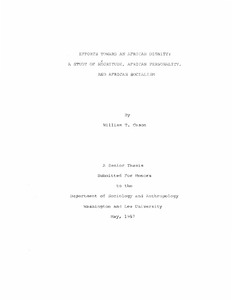| dc.rights.license | In Copyright | en_US |
| dc.creator | Cason, William Todd | |
| dc.date.accessioned | 2023-10-20T15:49:16Z | |
| dc.date.available | 2023-10-20T15:49:16Z | |
| dc.date.created | 1967 | |
| dc.identifier | WLURG038_Cason_thesis_1967 | |
| dc.identifier.uri | https://dspace.wlu.edu/handle/11021/36242 | |
| dc.description.abstract | It is with mixed emotions of indignation and anger that thoughtful, knowledgeable Africans have witnessed and experienced the injustices , frustrations , and degradation heaped upon the African masses and traditional African
culture. The rise of African nationalism and the drives for independence -- politically, as well as economically, socially, culturally, and mentally -- were direct responses on the part of sensitive Africans to free Africa from the
colonial yoke. Over the years, and especially since independence, certain educated Africans have been earnestly trying to recapture (or, as has been argued, to f oster) that sense of pride and dignity in Africa -- it s nations,
people , and culture -- that was so senselessly ignored and destroyed with the coming of the white European to the African continent. The concepts of Negritude and African Personality are intellectual, though somewhat mystical, attempts to restore to the individual African his sense of identity and dignity -- to make him proud o f his country, his blackness, and his traditional African heritage. Yet, being intellectual approaches, these ideas necessarily evade the comprehension of the great masses of uneducated Africans; as such there is considerable doubt as to the effective range of their present influence (being restricted mainly to the elite) or as to their permanence in the future. Cooperative work groups and rural animation are unique African efforts to put the ideas of African Socialism into practice in several African nations. The sponsorship of the creative and performing arts, as well as the important re-writing of African history -- all of which are embodiments of Negritude and African Personality -- constitute more realistic approaches to the creation of a sense of dignity at the level of the African masses. Increasingly, African leaders are recognizing that their struggle for dignity must be waged not on a lofty, conceptual plane, but at the grass roots with hard work and practical teamwork encompassing all of the African people. [From Epilogue] | en_US |
| dc.format.extent | 220 pages | en_US |
| dc.language.iso | en_US | en_US |
| dc.rights | This material is made available for use in research, teaching, and private study, pursuant to U.S. Copyright law. The user assumes full responsibility for any use of the materials, including but not limited to, infringement of copyright and publication rights of reproduced materials. Any materials used should be fully credited with the source. | en_US |
| dc.rights.uri | http://rightsstatements.org/vocab/InC/1.0/ | en_US |
| dc.subject.other | Washington and Lee University -- Honors in Sociology | en_US |
| dc.title | Efforts Toward an African Dignity: A Study of Negritude, African Personality, and African Socialism | en_US |
| dc.type | Text | en_US |
| dcterms.isPartOf | WLURG038 - Student Papers | en_US |
| dc.rights.holder | Cason, William Todd | en_US |
| dc.subject.fast | Socialism -- Africa | en_US |
| dc.subject.fast | African Americans -- Race identity | en_US |
| local.department | Sociology | en_US |
